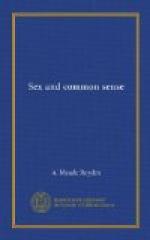Let me add that, while I hold that the persistent and unconquerable conviction of two people that they ought to be divorced ought ultimately to entitle them to it, this should not be the case if one only of two married people seeks release. In this case, the decision should be entirely with the court.
To those who feel that not only our Lord’s words but also the interpretation put upon those words by the Church is of supreme importance, the following statement will be of interest: “It is quite arguable that relief may be granted on the grounds that what is impossible cannot be done. It may be shown on the one hand that to such and such a person it is morally impossible to live with such and such another person, and on the other hand that it is morally impossible to live without marriage. In such instances there is room for the exercise of our ’dispensation from the impediment of the legamen’ (bond). This is the practice of the Eastern Church, which allows the innocent party to re-marry, and also grants relief in cases of incurable insanity.”
With regard to the Western Church, “Divorce and subsequent re-marriage in pre-Reformation days were only allowed on grounds existing before the contract was entered into. (There seems good reason for the belief that our Lord’s words as recorded by St. Matthew refer to prenuptial unchastity.) But in spite of this apparently narrow restriction there were fourteen grounds on which a marriage could be declared null and void before the Reformation, and it was constantly being done. Canonists and Theologians taught that the full and free consent of parties was essential to marriage—which teaching obviously would enable a very wide view of the subject to be taken."[J]
[Footnote J: From a “Memorandum on Divorce,” published in The Challenge, July 5, 1918.]



